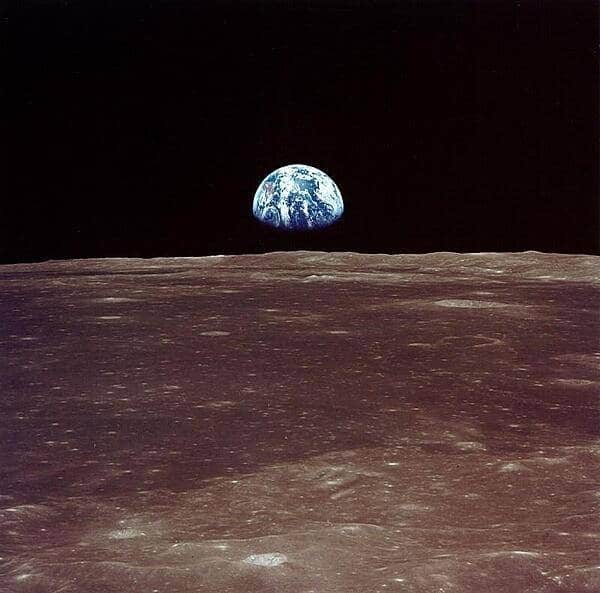October 13, 2021—At 90 years old, William Shatner became the oldest person to go to space, where he experienced something so unique, something so profound that it reportedly brought him to tears. Upon returning to the Earth’s surface, Shatner reflected, “I hope I never recover from this… What I would love to do is to communicate as much as possible the jeopardy, the moment you see the vulnerability of everything. It’s so small. This air which is keeping us alive is thinner than your skin… Everybody in the world needs to see.” ("William Shatner cried telling Jeff Bezos about his flight to space”)
What Shatner experienced is well known to spacefarers as the “Overview Effect,” a term coined in 1987 by science writer Frank White to capture the shared experience of astronauts who, after launching from the Earth’s surface and passing through the bright blue and paper-thin atmosphere, looked back to experience such a stunning view of the Earth that it literally changed the way they thought about the planet and humanity. In fact, the phenomenon is so well known to those in the spacefaring community, that new astronauts “are socialized through interactions with more experienced colleagues to expect some sort of response” when they see the Earth from outer space for the first time. (Weibel 9)
Many make note of how fragile the Earth looks from so far away, how thin the life-sustaining atmosphere truly is as William Shatner noted, and end up taking on an even more environmentally conscious worldview upon their return. Others come away from the experience reporting that the geopolitical divisions we take for granted, those that cause strife and conflict are empty divisions. As one astronaut described, “we’re all earthlings, the only border that matters is this line of atmosphere that blankets us all.” (Weibel 7) Another astronaut reflected on the possibility of such a perspective shift influencing future actions when he said, “Those views can guide us as human beings. If you look upon it [as though] we all are sharing this little spaceship, it would guide our behavior differently. We wouldn’t be at war all the time.” (Weibel 9)
Due to its humanitarian and environmental impact, many have wondered whether or not that perspective shift might be available in some way for the rest of us. Some have suggested that a trip to the Grand Canyon or simply taking a long look out at the vastness of the open ocean can elicit similar responses (Kluger). Recently, however, projects involving the use of VR (virtual reality) headsets and sensory deprivation tanks seek to do so in a more robust fashion. In fact, one astronaut—Edgar Mitchell, who is the sixth man to walk on the moon—even opened the Institute of Noetic Sciences in order to “study the type of instantaneous knowledge he claimed to have received about the unity of the universe and humankind while in space,” because he believed so strongly in the power of that perspective shift. (Weibel)
While the vast majority of us will never be able to encounter the fragility of Earth to the extent that a spacefarer might, one astronaut insisted that while witnessing the Earth floating in blackness certainly “puts that reality in your face in a way that you can’t deny,” she went on to assert that “[y]ou don’t have to go to space for this.” (Weibel 7-8)
If you’d like to learn more about the Overview Effect or any other topic, reach out to a reference librarian. We’ll be happy to help you get started on your research! Happy Space Day!
Works Cited
Kluger, Jeffrey. “The ‘Overview Effect’ Forever Changes Some Astronauts’ Attitudes Towards Earth—But You Don’t Need to Go to Space to Experience It.” Time.Com, Aug. 2021, p. N.PAG. EBSCOhost, https://search.ebscohost.com/login.aspx?direct=true&db=a9h&AN=151878321&site=ehost-live.
Weibel, Deana L. “The Overview Effect and the Ultraview Effect: How Extreme Experiences in/of Outer Space Influence Religious Beliefs in Astronauts.” Religions, vol. 11, no. 8, Aug. 2020, p. 418. Crossref, https://doi.org/10.3390/rel11080418.
"William Shatner cried telling Jeff Bezos about his flight to space: 'I hope I never recover from this'." The Business Insider, 13 Oct. 2021, p. NA. Gale General OneFile, link.gale.com/apps/doc/A678867883/ITOF?u=lln_ptamm&sid=bookmark-ITOF&xid=9efa4551, opens a new window. Accessed 24 Mar. 2022.




Add a comment to: Hurray, Space Day: What is the Overview Effect?